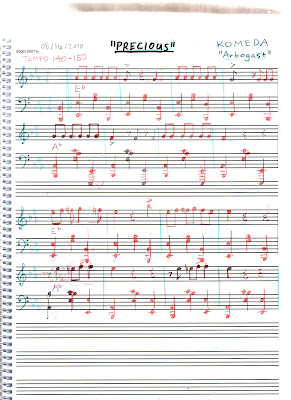

 Check out the great Marimba the girl has to play, just her size. The chamber be low the notes you hit amplify the sound. Mine do not have these, these are the real thing.
Check out the great Marimba the girl has to play, just her size. The chamber be low the notes you hit amplify the sound. Mine do not have these, these are the real thing.



 Check out the great Marimba the girl has to play, just her size. The chamber be low the notes you hit amplify the sound. Mine do not have these, these are the real thing.
Check out the great Marimba the girl has to play, just her size. The chamber be low the notes you hit amplify the sound. Mine do not have these, these are the real thing.

By Eric Stefani
Teacher Dave Caballero
Tuesday August 10 2010
12 - 12:30
Throughout the piece (and throughout the book for that matter) the left hand plays a
"MINOR CHORD"
using the far left pinky to play the "third" of the chord using "5" the fifth finger.
This is used several times in this particular piece of music.
- - - - - - - - - - - - - - - - - - - - - - - - - - - - - - - - - - - - - - - - - - - - - - - - - - - - - - - - - - - - - - - - - - - - - - - - - - - - - - - - - - - - - - - - - -
1) Learning inversions and shapes- The song uses "inversion" during the beginning, middle and end.
2) Starting on the 9th measure the left handed bass notes use fingering "3" and "4". Learning his important point enables the accordionist to play this difficult passage. The usually way of playing the left hand is thrown out.
3) The "grace-note" during this section falls on the "second beat" but the performer who practices this song for many days will be tempted to play it on the "first beat" since is has got his hands full with the left hand.
4) Measure 22 calls for much of the same, the treble clef is calling for eight notes and eight rest but since the accordionist is so concerned with hitting the correct notes (on the left hand "3" and "4" and now "5" with the "G") it is very difficult to play correctly.
5) Page 2 is the most "non- musician" people friendly part. Who can forget Yosemite Sam yelling at Bugs Bunny to the part correctly until he has to go play it and the dynomite egnites.
6) The accordionist must learn to play "Die Fledermaus" soft to loud while also staccato.
7) The third measure on page 3 of this piece (page 35) the accordionist must use the "3" and "4" fingering on the left hand in order to resolve the chords on measue 5.
8) The next section makes the accordionist learn to jump in octaves within the same melody. It is very difficult to learn but can learn over time.
10) Page 4 changes a third key signature with a "trill" that is very difficult to play while the left hand plays a separate rythm.
11) "Tales from Vienna Woods" is probably the most difficult section placing graces notes between harmonic melodies that cause anxiety for the accordionist.
12) Coming out of the ending of this passage is particuar difficult with the left hand playing the lead and the left jumping around with the "4" and "2" finger.
13) Page six has some odd timing things going in the right hand harmonies. But one may notice the left hand bass notes remains on "C" for eight measures straight!
14) "8va" is placed on 4 out of the 5 pages so watch for those. Miss them and you have to start over.

 Here's a piece of music I've been on for two weeks. The song should be played on an organ, that's what Bach wrote it on. The piano wasn't invented yet, only harpsichord and organ. The "G" hanging throughout make it sound like a drone like the sound of a bagpipe.
Here's a piece of music I've been on for two weeks. The song should be played on an organ, that's what Bach wrote it on. The piano wasn't invented yet, only harpsichord and organ. The "G" hanging throughout make it sound like a drone like the sound of a bagpipe.

 I picked up a new book title the "Sounds of Star Wars". While pages in the book have pictures pointing out the part in the film you can trigger the sounds with a button from all six movies. Truly entertaining. Plus each sound is by it's self without the dialogue or music.
I picked up a new book title the "Sounds of Star Wars". While pages in the book have pictures pointing out the part in the film you can trigger the sounds with a button from all six movies. Truly entertaining. Plus each sound is by it's self without the dialogue or music.